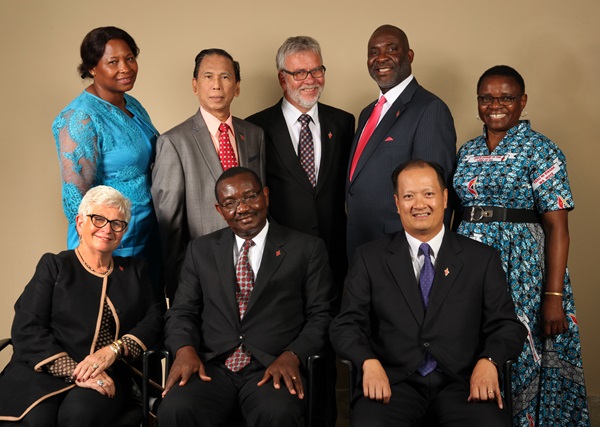The Judicial Council, at its April 2019 meeting, reviewed actions taken by the special General Conference in February. The council serves as The United Methodist Church's supreme court. General Conference, the denomination's top lawmaking body, passed the Traditional Plan, which enhances current policies about homosexuality and strengthens enforcement, and approved procedures for local churches to disaffiliate from the denomination and retain local church property.
General Conference delegates then asked the Judicial Council to rule on "the constitutionality, meaning, application and effect" of the Traditional Plan. In addition, the Council of Bishops requested a declaratory decision on the constitutionality of the disaffiliation plan.
The Traditional Plan: Decision 1378
The court considered whether to rule on the Traditional Plan as a whole, but determined instead to rule separately on the constitutionality of each of the petitions making up the plan.
Decision 1378 reaffirmed the court's previous ruling that seven petitions in the Traditional Plan are unconstitutional and therefore null and void. The remaining provisions (excluding one sentence) are constitutional.
The constitutional provisions include:
- Petition 90032 — expands the definition of "self-avowed practicing homosexual" to include those "living in a same-sex marriage, domestic partnership or civil union, or is a person who publicly states she or he is a practicing homosexual."
- Petition 90036 — prohibits bishops from consecrating, commissioning or ordaining self-avowed homosexuals. (The text does not include the word "practicing.")
- Petition 90042 — mandates penalties for clergy convicted of performing same-sex wedding ceremonies. Those penalties are a one-year suspension without pay for the first offense and termination of conference membership and church credentials for a second offense.
More about the Judicial Council
- What is the Judicial Council?
- The Judicial Council: the UMC's top court: Watch video
- Decisions and Dockets
- Petition 90043 — prohibits conference boards of ordained ministry from approving candidates not meeting ordination standards regarding sexuality.
- Petition 90044 — allows complaint dismissal only if it has no basis in law or fact and mandates information shared with the complainant during the complaint process.
- Petition 90045 (excluding the second sentence) — expands just resolution requirements to include a statement of harms involved and how the resolution addresses them.
Note: A sentence mandating that each just resolution include a commitment by the respondent not to repeat the violation was ruled unconstitutional and is therefore null and void. - Petition 90046 — requires the complainant to be a party in the just resolution process.
- Petition 90047 — allows the church to appeal errors of law from trial court findings to the Judicial Council.
These changes take effect in the U.S. Jan. 1, 2020. In Africa, Europe and the Philippines, the legislation will take effect in May 2021, 12 months after the next General Conference in May 2020.
Disaffiliation: Decision 1379
The Judicial Council also reviewed the amended legislation allowing a "gracious exit" for churches to leave the denomination. Petition 90066 was previously ruled unconstitutional; however, delegates amended it. The amended version creates a new paragraph dealing specifically with the "limited right" to disaffiliate for reasons related to church law on homosexuality.
Requests from churches that want to leave the denomination must meet three minimum requirements:
- The disaffiliation resolution must be approved by a two-thirds majority of the professing members of the local church present and voting at the church conference.
- The conference board of trustees establishes the terms and conditions, including the effective date, of the agreement between the annual conference and the exiting local church in accordance with applicable church law and civil laws.
- The disaffiliation agreement must be ratified by a simple majority of the members of the annual conference present and voting.
The court ruled the new paragraph satisfies the first two required conditions for disaffiliation, while a provision elsewhere in The Discipline, requiring annual conference action, fulfills the third minimum requirement.
Decision 1379 said the amended petition, taken together with the consent of the annual conference, "is constitutional and provides a means for the disaffiliation of a local church."
Requirements for exiting churches include payment of apportionments, fair share of pension liabilities and other obligations. This legislation requires the process for exiting the denomination to be completed by the end of 2023, at which time the provisions of the new paragraph expire.
This legislation goes into effect immediately in the U.S. and on Jan. 1, 2021, outside the U.S.
This content was produced by Ask The UMC, a ministry of United Methodist Communications.





